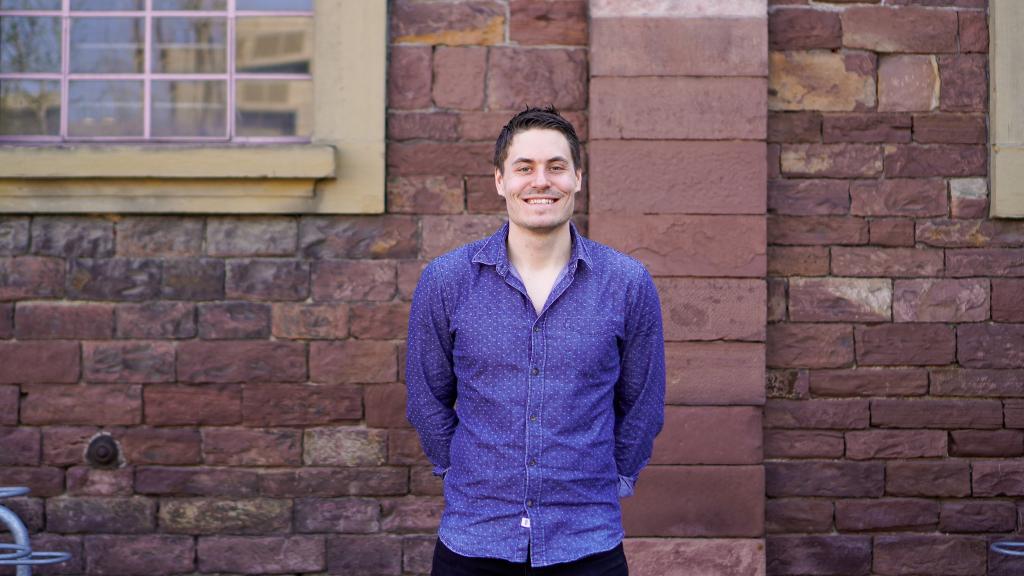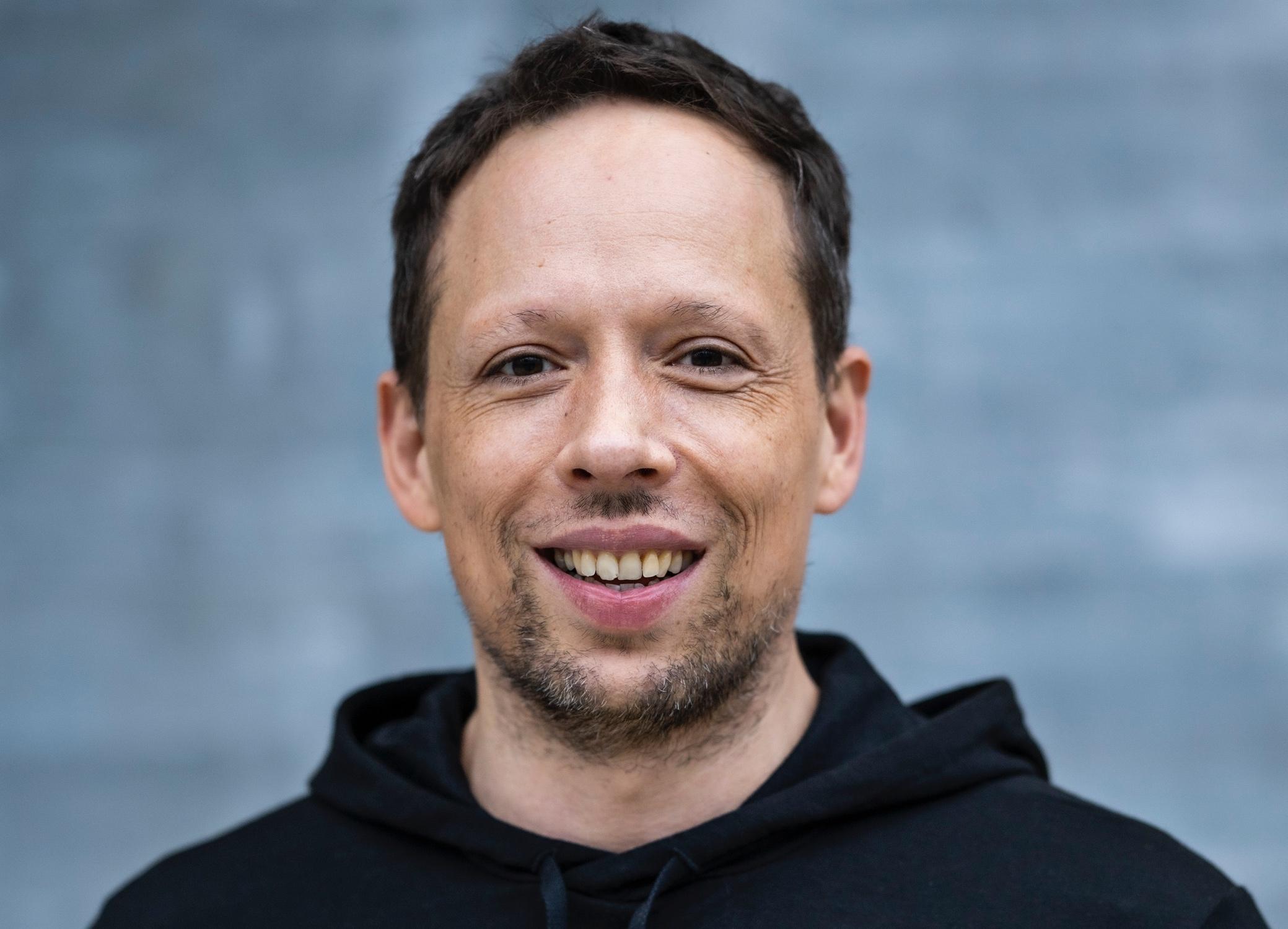"I had anxiety attacks"

Marius Krämer is co-founder of the start-up Heyvie. In this interview, he talks about why sick or exhausted people shouldn't come to work, how this attitude has changed his start-up and why this change is the hardest for him.
Just under a year ago, Marius Krämer and his co-founder Hady Daboul officially launched their app. Heyvie is the name of the app, which uses neurocentric training to prevent or even actively combat headaches and migraines. The idea behind it: Every movement we make originally comes from the brain and every movement reports back to the brain. There is now a twelve-strong team behind the app and founder Krämer had to realize that constant presenteeism, i.e. being sick or exhausted, does not work. So he rebuilt it.
Mr. Krämer, you claim that I can reduce my migraines with my tongue. How is that supposed to work?
With the help of neurocentric training. It's been around for many years, but hardly anyone in Germany knows about it. The idea is that every movement can trigger and activate a certain reaction in the brain. This can reduce migraines, for example, because they often occur when one side of the brain is less active in certain areas of the brain. By activating this side with the help of exercises, we reduce the risk or severity of migraines. This exercise can then be a movement with the tongue, but also with the jaw. This works preventively, but some of our users also use it when they notice that a migraine attack is approaching in order to avert it.
Sounds a bit like a miracle cure. Is that scientific?
It's actually very scientific, there are many studies that show the activation of areas of the brain through movement and also that pain can be reduced by activating certain areas of the brain.
You've been running the app for over a year now. A lot has happened to you in the process.
I had a real "lightbulb" moment just before Christmas last year. At the time, I was dealing with presenteeism, the phenomenon of people coming to work sick, exhausted or virtually unfit for work. This could be back pain, headaches or migraines, and that costs companies much more productivity than they thought. I found that blatant. And then I also thought to myself: Shit, you know how it is.
Founders have to accept it: Sometimes it's OK not to be productive.
Marius Krämer, founder
What did you put it down to?
Back then, I was running twelve hours, 14 hours a day at work, and then at the weekend. But was that productive at all? As a founder, you always believe that you have to work as much as possible. But founders have to accept that: It's sometimes OK not to be productive. And that must also apply to the team. Unlike the founders, they don't have a 40 or 50 percent stake in the company, but they are often expected to work as if that were the case. But no matter what "hustle culture" applies in the start-up scene, I can't expose the team to that kind of risk. So as an ice-cold company I might be able to, but as a person I don't want to.
Have you experienced presenteeism yourself?
I had anxiety attacks, as probably every founder does. I always know what funding we have, what the runway is like, how much money we're burning, when we need money again and then there's this huge pressure from outside, all of which can paralyze you. And that's presenteeism as it's written in the picture book: I'm present then, but I can't concentrate, I just jump from task to task and I'm no longer productive. That's completely human, but you first have to come to this realization and then change a lot of things.
That's why it's perfectly OK for us today if someone says: 'I can't concentrate right now, my back is bothering me or I'm feeling anxious. I'm not working now, I'm going to the bouldering hall.
Marius Krämer, founder
How can we imagine the process in your company?
The first step was certainly to accept the situation and talk about it openly with my co-founder. We then changed our expectations of the team. Just because I put my health at risk by overworking myself doesn't mean I can expect the same from my team. That's why it's perfectly OK for us today if someone says: 'I can't concentrate right now, my back is hurting or I have anxiety. I'm not working now, I'm going to the bouldering hall'. Then he or she does the work either later in the evening when they feel better or maybe not until the next day and we as founders think that's fine. I mean, why should I be against it? It's no use to me if he or she sits in the office and doesn't get anything done. Two productive hours later are much more worthwhile.
Does this rule always apply?
We often try to make it possible, but of course it's not always possible. If there's a deadline and we really need to finish urgently, not everyone can spend the day in the park. We are a small start-up and not every position can be replaced at any time. But if it's possible, we want to make it easier to organize work around everyday life and not the other way around.
That means what exactly?
It means, for example, that employees get a call from their family saying they urgently need to go home. Then they can do this at any time. Or they need time off, then they can take it. I don't care who works when and where, the main thing is that the work gets done in the end. And I notice that the happier people are with their working hours and their flexibility, the more productive they become. We may work fewer hours these days, but we get more done on paper.
It turns everything on its head.
Marius Krämer on asynchronous working
Does it also change work processes when half the workforce goes bouldering on Monday mornings instead of going to the office?
It turns everything upside down. That's why we're switching to asynchronous working. That means we write to each other on Slack or Notion, even if the person we're writing to is sitting next to us in the office. It often looks awkward, but it makes sense. That way, the person can work through the message or comment when it suits them and is not constantly ripped off. There are exceptions, of course, if something is urgent, then we tap them on the shoulder or call them.
Is this change difficult for the team?
It certainly takes time to get used to it as a team, but it's much worse for me and my co-founder Hady. As a founder, you're not necessarily on a high horse, but when I ask a question, I expect someone to answer it quickly. That's nonsense, of course, and if I think about it realistically, it doesn't matter whether someone answers immediately or not until the evening. I'm just learning to be more realistic.
Personal details: Marius Krämer, 31, studied International Management and then worked at Scaleup Bynder, where he has since been involved in various projects, including a crypto fintech from Bielefeld. In his free time, he spends every minute bouldering or on camper trips with his dog and girlfriend.

Newsletter
Startups, stories and stats from the German startup ecosystem straight to your inbox. Subscribe with 2 clicks. Noice.
LinkedIn ConnectFYI: English edition available
Hello my friend, have you been stranded on the German edition of Startbase? At least your browser tells us, that you do not speak German - so maybe you would like to switch to the English edition instead?
FYI: Deutsche Edition verfügbar
Hallo mein Freund, du befindest dich auf der Englischen Edition der Startbase und laut deinem Browser sprichst du eigentlich auch Deutsch. Magst du die Sprache wechseln?









